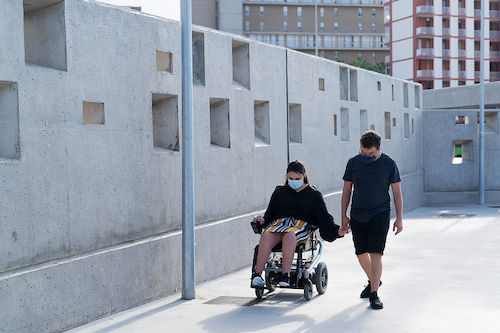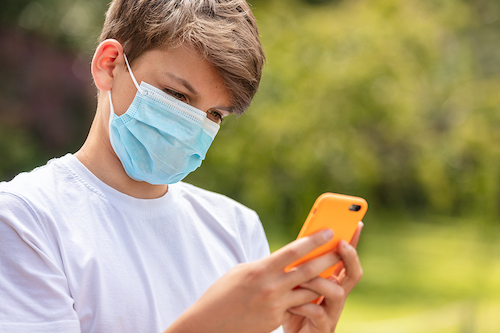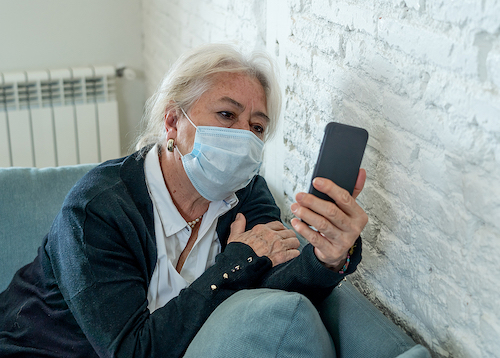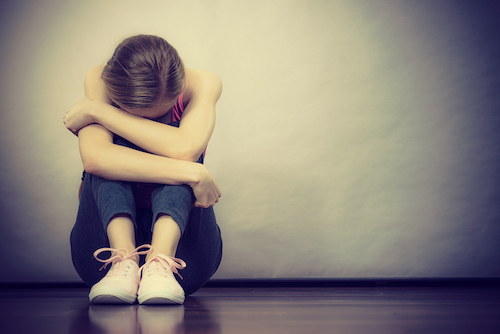February 27, 2022
by Elizabeth Pratt

Those living with disabilities during the COVID-19 pandemic are experiencing high levels of depression and anxiety.
Researchers from Yale, Oregon State University, Olin College of Engineering, Hiram College and Macalester College found that there has been a significant increase in the number of people with disabilities living with depression since the start of the pandemic.
[More]
March 30, 2021
by Elizabeth Pratt

Just over a year since the COVID-19 pandemic began in the US, parents are reporting worsening mental health in their teenagers.
The CS Mott Children’s Hospital National Poll on Children’s Health at Michigan Medicine found that almost half of parents have noticed a worsening or new mental health condition in their teenagers since the start of the pandemic. Three in four say the pandemic has negatively impacted the social interactions of their teens.
[More]
November 30, 2020
by Elizabeth Pratt

Throughout the COVID-19 pandemic, many people have experienced feelings of social isolation. For some, interaction with others has been confined to a zoom call, for others there hasn’t been any interaction at all. Now, researchers at MIT have found that the longing for social interaction felt whilst isolated is neurologically similar to that for food cravings when hungry.
[More]
December 30, 2018
by Elizabeth Pratt

Loneliness is at epidemic levels around the world, and new research has found it is particularly prevalent in the late 20s, mid 50s and late 80s.
[More]
Astronaut and veteran Scott Kelly, 51, is preparing to live a full year in the international space station in order to study the impact a year in space could have physically, mentally, and emotionally. The objectives of this mission are to study the potential biological, as well as psychological, impacts of prolonged time in space on a human being. This mission could have broader implications as NASA looks to the future in creating space stations for human beings, as well as possible hubs on the moon where individuals would live and work.
[More]
For most of us, meeting with misfortune and struggle is a part of life. In fact, surviving adversity is often viewed as beneficial and necessary. According to one Danish Proverb: “A gem cannot be polished without friction, nor man be perfected without trials.” When a person survives life’s difficulties and demonstrates the ability to withstand all of the stress that goes along with it, he or she is described as “resilient”. The Oxford Dictionary defines resilience as “The ability of a substance or object to spring back into shape.”
[More]
February 25th. Anti-Bullying Day in Canada has been coined "Pink Shirt Day". Throughout many communities in Canada yesterday people saw pink! From the Starbucks Barista to the bank teller, the country took a stand against bullying. Mostly, the emphasis on bullying and its effects was directed toward the bullying that takes place in schoolyards.
[More]
September 4, 2013
by Ashley Marie

A couple of months ago, our neighbor knocked on the door of apartment 24. She had never done so before, so she had no idea who would answer it.
That person happened to be me. She quietly sighed with relief – probably thankful that I was not a grumpy scrooge in a shabby robe that had just been awoken by a total stranger on a Saturday morning.
Then she sheepishly asked, “Do you happen to have a plunger that I can borrow? We just moved in, and our toilet is clogged.”
“Of course,” I replied. “Just wait here, and I’ll be right back.”
She smiled as she thanked me and quickly turned towards the hallway to walk back to her front door. About half an hour later, she came back, returned the plunger, and we said goodbye.
You might think that I was being polite. But I didn’t even bother to ask what her name was. In fact, I didn’t even know that she was new to the building. After I closed the apartment door, I closed the door on an opportunity to make a new acquaintance.
Perhaps it was my fault. And perhaps it was also characteristic of 21st-century urban society.
I can’t help but wonder what our brief encounter would have been like if we were of a different time period, of a different generation.
I recall the day my Grandma welcomed her new neighbors into their cul-de-sac. She spent the whole afternoon baking chocolate chip cookies. Then, we left her kitchen and walked across the street together. We rung her neighbors’ doorbell and greeted them with a basket of freshly baked cookies. Grandma’s warmhearted welcoming felt so natural and charming – not distant and reserved.
And now I wonder whether something has been lost somewhere between Grandma’s generation and mine. She carries with her a certain level of finesse, etiquette, and propriety that I wish I possessed.
Emily Post: The Face of American Etiquette in the 1920s
Emily Post, a famous American writer on etiquette, explained that etiquette is something that can be developed by all, regardless of one’s background or socio-economic status.[1] Etiquette, she wrote, involves both ethics and good manners. Her writings pay a great deal of attention to the importance of considering the well being of others.
Though in many ways Emily Post’s notions of etiquette might be a bit outdated – and even awkward – for modern day interactions, there is something to be learned from the social graces of the Roaring Twenties.
Young girls in finishing schools devoured her books on how to conduct oneself in a multitude of scenarios, and many of these lessons still apply to the 21st century.
A young lady would greet an elderly lady in the hallway with a “How do you do, Mrs. Jones?” A gentleman would offer his arm to an ill person if he saw that they were having trouble walking. Customers would speak politely to salespeople – it would be considered a sign of ill breeding and selfishness to do otherwise. Guests at a dinner party would not take more than their share of food at the table. Pedestrians would not litter the streets with their garbage. And we would greet our new neighbors with a friendly introduction, a greeting card, and a small gift.
A Forgotten Art: The Art of Conversation
In 2009, Catherine Blyth published a book, The Art of Conversation, which reiterates some of the consequences of our gradual loss of social graces.[2] In it she explains that we are losing our appreciation for conversation, face-to-face dialogues, and the delight of striking up a spontaneous conversation with a total stranger.
What strikes me most is that conversation is not merely a tool, a duty, or an obligation – it is a pleasure, something that adds value to our lives. Talking with someone else, even if just for a couple of minutes with a stranger, can be an enriching experience.
Is our society afraid of conversation? Is exchanging names with a new neighbor considered intrusive? Should it not be a sign of friendliness? Are we too busy to help that elderly lady cross the street or to hold the door for a stranger?
Bad Manners and Social Anxiety
Unfortunately, our lack of social graces can negatively affect the well being of others. When we are rude, short, or temperamental with others, we do not consider how our actions affect those around us.
Unfortunately, our gradual loss of social graces has the potential to harm others, sometimes encouraging or reinforcing the development of social anxiety.
Broadly speaking, social anxiety involves feelings of discomfort or worries that stem from social interactions.[3]
A good friend of mine struggles with social anxiety. Earlier this year, she recounted a disastrous family gathering where a relative was deliberately rude to her. She came home not only feeling hurt, but even more anxious about social interactions than before.
Bad manners and bad behavior are inexcusable and can have a lasting impact on society.
May we all do our part in improving our manners - not only as a sign of finesse, but also as an ethical consideration for the well-being of others. Though we no longer live in the 1920s, we can still strive to be a friendly, charming, and well-mannered people.
If you struggle with social anxiety or panic attacks, there are therapists who can help you. Mental health practitioners want you to feel valued and want you to develop meaningful relationships with others. Together with a therapist you can work through the causes of your anxiety and learn coping tools to help you function with less stress and more joy.
[1] Post, Emily. 2007. First published in 1922. Etiquette: In Society, in Business, in Politics, and at Home. New York: Cosimo.
[2] Blyth, C. 2008. The Art of Conversation. New York: Penguin.
[3] Jacobs, A., and Antony, M. 2008. Social Anxiety Disorder and Social Phobia. Social Anxiety Support. [online] Available at: <http://www.socialanxietysupport.com/disorder/#what> [Accessed on 1 September 2013].
September 1, 2013
by Cindy Marie Hosszu

Social Creatures
We humans are social animals. Our minds and bodies are wired to socialize for good reason. As a species, we use our socialization to solve problems, find safety, and survive. Every now and then, of course, we need a break from the social pack, and to retreat to a more quiet state of solitude, but what happens when that solitude becomes isolation?
Sometimes we feel alone, even in a crowded room. Sometimes we have no choice in the feelings, and other times, we enjoy being alone, and choose to separate ourselves from others. It may start with a change in our lives, like moving to a new area, or off to college. It could be that people have disappointed us, and we feel the need to protect ourselves from the feelings of pain associated with the loss of someone from whom we expected more, or that made us feel unwanted or unloved. Maybe we just feel socially inadequate, or ill at ease with others.
Regardless of how it starts or what perpetuates isolation, it is important that we understand the relevance of being socially connected to others. We connect to others on different levels. For some, this connection can be a strong bond, and for others it may be small talk with strangers, but in all cases, we are increasing our ability to survive, as well as securing our human instinct. It is important that we human animals consider the reasons that socialization is built into our system. We need each other to survive, and problem solve.
Dying To Be Social
In 2006, researchers reviewed data gathered from over two decades and found that Americans were less and less connected socially.[1] The average network had decreased by about a third from 1985 to 2004. With the changes in technology from smart phones, and tablets, the average person is far less likely to engage in person to person contact as they were even in 2004. You can see this when you observe most restaurants and see families of people all engaged in their personal devices. Even in a family unit, we seem to be losing our socialization, and that is alarming considering how damaging isolation can be to individuals.
A 2013 study found that social isolation is associated with a shortened life.[2] The study, led by Andrew Steptoe, followed 6500 men and women 52 and older, and measured the consequences of loneliness and isolation on health. While both can affect well-being, the researchers found that isolation, independent of loneliness, has 1.26-fold increase in death. One of the interesting things that this study highlights is that while we may feel lonely, any kind of social interaction, even as small as chit-chat with a stranger can help our health. It is not necessarily those strong bonds of close relationships. It also points out that even those who are content in their solitude need the contact of others to be healthy. Some of the reasons that may contribute to isolation’s effects on older adults are that there is no one to notice when they are declining, and they do not get the help they need, whether it be physically, or emotionally.
Social Media Doesn’t Count
Those who prefer to avoid the physical social contact may be tempted to use social networking as surrogate social contact, but that is not a good choice for those who like to be alone. Social networks may add to the problem of social isolation by creating negative feelings toward others. German research has found that social sites, specifically Facebook in this study, make people feel lonelier due to envy.[3] The reader of a social update may feel that others have more enjoyment in life, and have better social opportunities than themselves. Of the things that frustrated users in the study, 29.6 % felt envy, or social upward comparison. Another 10.4% felt loneliness, and 19.5% felt a lack of attention due to lack of comments, likes, and feedback. The areas in which envy was produced were travel and leisure, social interactions with others, love, family, and relationship success. Interestingly, this research was specific to passive users. For more about social media, read Therapy: A Connection with the Interconnected.
How Does Therapy Help?
Therapy can help determine the emotional and psychological reasons for the need to isolate, as well as give support and help to build a social support network. When we find it hard to make friends, or that social interactions are just too much for us, a therapist can offer tools that allow us to cope with the situation. If you find yourself feeling lonely, angry, or critical of others, or have no feelings of being part of a group there is someone who can not only listen, but equip you with the tools to help you out of feeling isolated.
[1] McPherson, M., Smith-Lovin, L., & Brashears, M. E. (2006). Social isolation in america: Changes in core discussion networks over two decades. American Sociological Review, 71(3), 353-375. Retrieved from http://search.proquest.com/docview/218830661?accountid=3358
[2] Steptoe, A., Shankar, A., Demakakos, P., & Wardle, J. (2013). Social isolation, loneliness, and all-cause mortality in older men and women. Proceedings of the National Academy of Sciences of the United States of America, 110(15), 5797. Retrieved from http://search.proquest.com/docview/1326426096?accountid=3358
[3] Krasnova, H., & Et al (2013). Envy on Facebook: A Hidden Threat to Users’ Life Satisfaction? Institute of Information System. Retrieved from http://warhol.wiwi.hu-berlin.de/~hkrasnova/Ongoing_Research_files/WI%202013%20Final%20Submission%20Krasnova.pdf